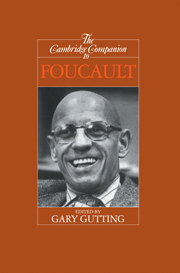Book contents
- Frontmatter
- Introduction: Michel Foucault: A user’s manual
- 1 Foucault’s mapping of history
- 2 Foucault and the history of madness
- 3 The death of man, or exhaustion of the cogito? Translated by Catherine Porter
- 4 Power/Knowledge
- 5 Ethics as ascetics: Foucault, the history of ethics, and ancient thought
- 6 The ethics of Michel Foucault
- 7 “What is enlightenment?”: Kant and Foucault
- 8 Modern and countermodern: Ethos and epoch in Heidegger and Foucault
- 9 Foucault and Habermas on the subject of reason
- 10 “Between tradition and oblivion”: Foucault, the complications of form, the literature of reason, and the aesthetics of existence
- 11 Foucault, feminism, and questions of identity
- 12 Foucault, Michel, 1926–Translated by Catherine Porter
- Bibliography
- Index
3 - The death of man, or exhaustion of the cogito? Translated by Catherine Porter
Published online by Cambridge University Press: 28 May 2012
- Frontmatter
- Introduction: Michel Foucault: A user’s manual
- 1 Foucault’s mapping of history
- 2 Foucault and the history of madness
- 3 The death of man, or exhaustion of the cogito? Translated by Catherine Porter
- 4 Power/Knowledge
- 5 Ethics as ascetics: Foucault, the history of ethics, and ancient thought
- 6 The ethics of Michel Foucault
- 7 “What is enlightenment?”: Kant and Foucault
- 8 Modern and countermodern: Ethos and epoch in Heidegger and Foucault
- 9 Foucault and Habermas on the subject of reason
- 10 “Between tradition and oblivion”: Foucault, the complications of form, the literature of reason, and the aesthetics of existence
- 11 Foucault, feminism, and questions of identity
- 12 Foucault, Michel, 1926–Translated by Catherine Porter
- Bibliography
- Index
Summary
The philosophers who have considered Cervantes's Don Quixote to be a major philosophical event can be counted on the fingers of one hand. Indeed, to my knowledge only two have done so: Auguste Comte and Michel Foucault. If Comte had written a history of madness – and he could have – he would have made room for Cervantes, for he referred to Don Quixote more than once in defining madness as an excess of subjectivity and as a passion for countering the contradictions of experience by endlessly complicating the interpretations that experience can have. Yet the author of L'Histoire de la folie turned to Descartes, not Cervantes, for help in presenting the Classical era's idea of madness. Conversely, in Les Mots et les choses, Cervantes and Don Quixote are honored with four brilliant pages, and Descartes is mentioned just two or three times. The single Cartesian text cited, a short passage from the Regulae, comes up only by virtue of the manifest subordination of the notion of measure to the notion of order in the idea of mathesis. And probably also by virtue of the precocious use of the Regulae in La Logique de Port-Royal, Foucault elevates that hitherto neglected account of the logic of signs and grammar to the status of a seventeenth-century masterwork. By this striking displacement of the sites where they might have been expected to be invoked as witnesses, Descartes and Cervantes come to be invested with adjudicative or critical power. Descartes is one of the artisans who set out the standards that resulted in the relegation of madness to the asylum space, where nineteenth-century pathologists found it as an object of knowledge.
- Type
- Chapter
- Information
- The Cambridge Companion to Foucault , pp. 71 - 91Publisher: Cambridge University PressPrint publication year: 1994
- 13
- Cited by

